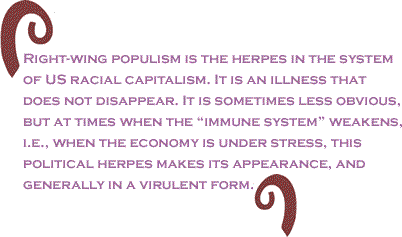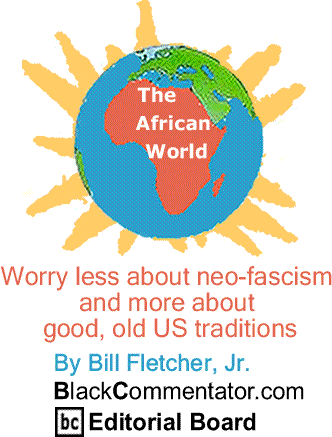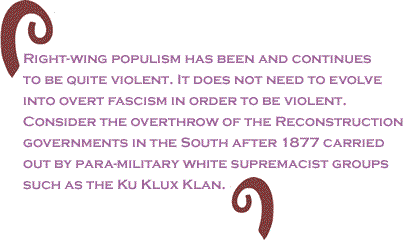
|
||||||||||||||||||||||
|
||
 |
||
As someone who has been warning about the danger of right-wing populism strengthening in the USA, this column may surprise some readers. When the Tea Party crowd demonstrated its racist, right-wing and violent essence, we began to see more attention in liberal and progressive circles focused on the danger posed by neo-fascist movements in the USA.� While there are fascist and quasi-fascist forces in our midst, what is being missed by too many commentators is that US history demonstrates time and again the violence that is associated with home-grown, racist right-wing populism. Right-wing populism is the herpes in the system of US racial capitalism.� It is an illness that does not disappear.� It is sometimes less obvious, but at times when the �immune system� weakens, i.e., when the economy is under stress, this political herpes makes its appearance, and generally in a virulent form. Home-grown right-wing populism is, in its essence, thoroughly racist and anti-Semitic.� It presumes that there is a white prerogative to dominate North America, and, indeed, the planet.� It suggests that there has been in the past and should continue to be a white bloc or alignment that crosses class boundaries ensuring that a white person, regardless of status in life, is superior�and protected�over anyone of color. Right-wing populism is not a phenomenon known only in the USA.� It is global, but there is a special form that we are witnessing in countries of the global North, particularly in Europe, Canada and the USA.� It is based on the irrational perception that whites are losing out compared to people of color.� As such, right-wing populism blurs a fundamental truth:� in the class system that we know as capitalism, those at the top, that minority of the upper 10% of the population, are benefiting at the expense of the bottom 90%.� In other words, many white people are, in fact, suffering, but not as a result of gains by people of color.� It�s the workings of the system. Right-wing populism has been and continues to be quite violent.� It does not need to evolve into overt fascism in order to be violent.� Consider the overthrow of the Reconstruction governments in the South after 1877 carried out by para-military white supremacist groups such as the Ku Klux Klan.� Think about the role of official arms of the state, such as the Texas Rangers, in the persecution of Chicanos in the Southwest.� Anyone remember groups like the White Citizens Councils during the period of the Civil Rights Movement?� How about the anti-Semitic violence of right-wing populists in the 1980s in the midst of the farming crisis of the Midwest? Remember the four little girls murdered in the Birmingham bombing of 1963? None of this is to make anyone feel more comfortable.� Actually, just the opposite.� The suggestions of the danger of neo-fascism unintentionally mask two important realities.� One, the inherent and violent history of right-wing populism in the USA that has historically engaged in all sorts of murder sprees and other forms of intimidation of political opponents of white privilege and the domination of society (if not the planet) by the wealthy.� Two, that there has been a growing authoritarian tendency within the states of the Western Europe, North America and Japan going back to the late 1970s, whereby the parameters for �acceptable� political engagement have been narrowed (this includes within the mainstream media, but also at the level of civil liberties).
The struggle for a defense of existing rights and liberties, not to mention the struggle to expand democracy, is not something that can await the overt danger of neo-fascism.� Neo-fascism may never arrive, but the political herpes of right-wing populism is staring us in the face and can bring with it great pain and the championing of barbarism. BlackCommentator.com
Editorial Board member, Bill Fletcher, Jr., is a Senior Scholar
with the Institute for Policy Studies,
the immediate past president of
TransAfrica Forum
and co-author of, Solidarity Divided: The Crisis in Organized Labor and a New Path
toward Social Justice |
||
If you would like to comment on this article, please do so below. There is a 400 character limit. You do not need a FaceBook account. Your comment will be posted here on BC instantly. Thanks. Entering your email address is not mandatory. You may also choose to enter only your first name and your location.
|
||
Thank you very much for your readership. |
||
| Any BlackCommentator.com article may be re-printed so long as it is re-printed in its entirety and full credit given to the author and www.BlackCommentator.com. If the re-print is on the Internet we additionally request a link back to the original piece on our Website. | ||
| |
||
April 1, 2010 |
| Executive Editor: David A. Love, JD |
| Managing Editor: Nancy Littlefield |
| Publisher: Peter Gamble |
| Est. April 5, 2002 |
| Printer Friendly Version in resizeable plain text format |
 |
 |
 |

|
 |
| |
| |













































